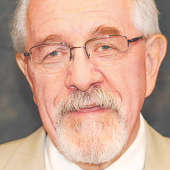- Christmas shopping is done, presents wrapped, strings attached? (12/14/16)
- Cecil is dead and human lives are threatened every day (8/12/15)
- As state flags go, Nebraska's ranks 50th (7/8/15)
- When everything looks like a nail (4/29/15)
- Who remembers to coal slurry pipeline debate? (3/11/15)
- More revelations in Department of Corrections mess (12/17/14)
- The Legislature becomes more Republican (11/19/14)
Opinion
Can prison reform survive property tax relief?
Wednesday, April 9, 2014
In the waning days of the Second Session of the 103rd Nebraska Legislature, one has to wonder if spending money on prison reform can survive a lame duck governor who has already vetoed millions of dollars to allegedly provide property tax relief.
The Legislature's Judiciary Committee has advanced a measure (LB907), which appears to address numerous problems with the system, and is broadly aimed at reducing recidivism. Much of the bill was brought on by the case of Nikko Jenkins, an Omaha man paroled last summer, who is alleged to have killed four people within weeks of his release. A state ombudsman's report concluded that Jenkins repeatedly asked for mental health help, which he never received.
Gov. Dave Heineman was an early proponent of prison reform but came down on the side of doing away with good time -- a measure that cuts an inmate's sentence in half for every good day (no infractions or write-ups) the inmate serves -- in favor of something he called earned time. Prison officials and Judiciary Committee Chairman Sen. Brad Ashford of Omaha say good time is a valuable tool for controlling inmate behavior. Good time, they point out, is also important given the current overcrowding in the state's prison system.
The governor has already vetoed $65 million from the state budget with a directive to use some of it to fund property tax relief. Included in that amount was millions earmarked for fixing the aging and failing HVAC system at the State Capitol as well as a proposed $2.5 million to build four courtyard fountains to complete the final design work of the building which is one of the outstanding architectural wonders in the country.
Property taxes are assessed, levied and collected by local governments based on guidelines developed and approved by the state. Exactly where the state will "throw" money to address the property tax problem remains to be seen. But it is obvious that this governor, who has spent more time in office (10 years) than any other governor, wants property tax relief to be his legacy. The question remains if prison reform will have a place in that legacy as well.
Heineman has talked tough on prison issues, saying that those who don't support his stand against good time are soft on crime. There has been plenty of push-back from the legislative branch, perhaps enough to shepherd this $14 million in prison reform through final reading and past a likely veto by the governor. The governor has said he wants to be dynamic in looking at issues and not be locked into one strategy. That dynamic failed when a specially appointed tax committee failed to recommend significant changes late last year and left throwing money at the problem as the primary strategy.
So now we have the prison reform bill which would: give the Office of Probation Administration $5 million to expand mental health services and $3.8 million to expand new reporting centers to better monitor parolees; $5 million to the Nebraska Crime Commission for the vocational and life skills program to train inmates to do something productive; and $200,000 to establish the Nebraska Center for Justice Research at the University of Nebraska at Omaha to get to the root cause of the issues which are generally emotionally charged. The measure would also create a re-entry program coordinator to advise corrections officials regarding programs that transition inmates into communities; and require the state Department of Correctional Services to ensure that an inmate's rehabilitation/re-entry program is complete or near completion upon the inmate serving 80 percent of his or her sentence.
In addition, an Ashford amendment to the bill would create the Nebraska Justice Reinvestment Working Group -- which would include state senators, correctional and law enforcement officials, judges, attorneys, community members and former inmates -- to assist the Council of State Governments Justice Center in producing a report that prescribes how to reduce prison overcrowding to 125 percent within five years.
That all sounds like prison reform. None of it sounds like anybody is being soft on crime. Let's hope it survives the property tax relief penchant of a term-limited governor.

